- Home
- Dan Gutman
The Lincoln Project
The Lincoln Project Read online
DEDICATION
TO LIZA, ANDREW, AND ROSEMARY
ACKNOWLEDGMENTS
THANKS TO:
Nina Wallace, David Lubar, Alan Kors,
Ray Dimetrosky, Craig Provorny, Howard Wolf,
Patty Mahoney Kropp, Zachary Lang,
Jennifer Mills-Knutsen, and Maura Jane Farrelly.
CONTENTS
Dedication
Acknowledgments
Introduction
Chapter 1
Chapter 2
Chapter 3
Chapter 4
Chapter 5
Chapter 6
Chapter 7
Chapter 8
Chapter 9
Chapter 10
Chapter 11
Chapter 12
Chapter 13
Chapter 14
Chapter 15
Chapter 16
Chapter 17
Chapter 18
Chapter 19
Chapter 20
Chapter 21
Facts & Fictions
Back Ad
About the Author
Books by Dan Gutman
Credits
Copyright
About the Publisher
INTRODUCTION
“Four score and seven years ago . . .”
It is Thursday, November 19, 1863. Two o’clock in the afternoon. It’s a warm day for autumn. President Abraham Lincoln stands tall over the speaker’s platform. A huge crowd is spread out on the grassy hillside before him, watching him deliver perhaps the most memorable speech in American history. He speaks slowly and clearly.
“. . . our fathers brought forth on this continent a new nation, conceived in liberty, and dedicated to the proposition that all men are created equal. . . .”
Cheers and applause wash over the audience. Lincoln has to stop to wait until the noise dies down before he can continue. He wants the people to hear every word he has to say.
While the president speaks, four shadowy figures, who just arrived in Gettysburg the night before and are unknown to everyone in the crowd, push and elbow their way past onlookers.
“Now we are engaged in a great civil war, testing whether that nation, or any nation so conceived and so dedicated, can long endure. . . .”
It will be fifteen months until the war is over. Fifteen months until Americans will finally lay down their guns and stop killing one another. And fifteen months until one of them will pick up a gun and assassinate the president himself. Lincoln glances up briefly to scan the crowd before him, but doesn’t notice anything unusual.
“We are met on a great battlefield of that war. We have come to dedicate a portion of that field, as a final resting place for those who here gave their lives that that nation might live. It is altogether fitting and proper that we should do this. . . .”
The four figures strain to hear the president’s words. They feel a sense of urgency as they try to get close enough to the stage. They won’t have a lot of time to complete their mission. They, and they alone, know that the president’s speech will be very short. Two hundred seventy words, give or take a few. In two short minutes, it will all be over. They have to act fast.
“But, in a larger sense, we can not dedicate—we can not consecrate—we can not hallow—this ground. The brave men, living and dead, who struggled here, have consecrated it, far above our poor power to add or detract. . . .”
One of the conspirators, a boy, holds a small device in his hand. It’s a strange-looking thing, or at least it’s strange-looking to the people who might have noticed it that day. Silvery and metallic, it’s small enough to fit in one hand, but powerful enough to change every history book ever written.
“The world will little note, nor long remember what we say here, but it can never forget what they did here. . . .”
The young man fiddles with the device in his hand. Something seems to be wrong. It’s not working. He stops moving forward. Time is running out. Droplets of sweat slide down his forehead. His hands have become slippery.
“It is for us the living, rather, to be dedicated here to the unfinished work which they who fought here have thus far so nobly advanced. . . .”
The young man gnashes his teeth. What’s the problem? he asks himself. He has to solve it. And fast. After all the preparation they have been through, it can’t end now. If he fails in this mission, all will have been for nothing.
“It is rather for us to be here dedicated to the great task remaining before us—that from these honored dead we take increased devotion to that cause for which they gave the last full measure of devotion . . .”
There are only a few seconds left. The young man’s companions surround him, imploring him to figure out what’s wrong with the device. He fiddles some more with the buttons, trying anything to make it work.
“that we here highly resolve that these dead shall not have died in vain—that this nation, under God, shall have a new birth of freedom . . .”
Finally, for reasons unexplained, the device turns on. It seems to be working to the young man’s satisfaction. He holds it up in the air over his head. He points it in the direction of the president.
“and that government of the people, by the people, for the people, shall not perish from the . . .”
As Abraham Lincoln speaks the final word of the Gettysburg Address, the boy pushes the button.
CHAPTER 1
THE YELLOW ENVELOPES
EVERY STORY SHOULD START AT THE BEGINNING, of course. As the old song goes, it’s a very good place to start.
This particular story begins in Boston, Massachusetts, and it takes place, oddly enough, in the present day. Or it starts in the present day, anyway. My apologies for not providing you with the exact year, but by the time you read this book, that year will very possibly have come and gone. Suffice to say, our story begins now. Let’s call it four o’clock in the afternoon, shortly after school has let out for the day.
There are four main characters you’ll need to keep track of as you read this story, but it shouldn’t be that difficult. Two girls, two boys. They’re all native Bostonians of approximately the same age—twelve years old.
Julia comes from an affluent family and attends the expensive, private, all-girls Winsor School, a short walk from Fenway Park.
Luke has more humble roots and lives in the Dorchester section of town. His parents are both longtime members of the Boston Police Department.
David—tall, thin, and athletic—is a good student but is more interested in cracking jokes than books.
Isabel is quite bookish, serious, and eager to succeed.
David, Isabel, Julia, and Luke have never met before this day, but circumstances beyond their control will bring them together, as you’re about to see.
David Williams was shooting hoops with some friends at Medal of Honor Park near East First Street. He came out to the park most days after school looking for a game. Usually, he found one with teenagers a few years older. On this particular day, he had just poured in a jump shot from the top of the key when everybody decided to take a water break. As David toweled off his face, a middle-aged man in a suit and tie leaned over the bench where David was sitting.
“Excuse me,” the man said. “Is your name David Williams?”
“Yeah, so what?”
David turned around and eyed the well-dressed man suspiciously. Was he a cop? A crazy person? Maybe he was a college recruiter. They scout kids really young these days.
The man handed David a yellow envelope, then turned on his heel and left without saying another word.
At almost the same time, Isabel Alvarez was doing her homework at a corner desk on the third floor of the Boston Public Library on Boylston Street. She usually came to
this spot because it was quiet and she wouldn’t be bothered by her family, or by giggly classmates who would rather socialize and gossip than get their schoolwork done. Isabel worked hard at her studies, having come to accept the conventional wisdom that hard work leads to a high grade point average, which leads to a smart mind, which leads to a good college, which leads to a high-paying job, which leads to a successful life.
She was deeply immersed in solving an algebraic equation with one variable when a man in a suit and tie tapped her on the shoulder, startling her.
“Excuse me,” the man whispered. “Is your name Isabel Alvarez?”
“Yes. Is something wrong?”
The man didn’t reply. He simply reached into his jacket pocket, pulled out a yellow envelope, handed it to her, and left.
Minutes later, Luke Borowicz was banging away on an old Ms. Pac-Man machine at the little grocery store on Washington Street around the corner from his house. Luke was a stocky boy with floppy brown hair, and he was wearing his favorite Red Sox T-shirt. He came to this store a lot, and seven of the top ten scores on the machine were immortalized with his initials. The game relaxed him. Even though he had been diagnosed with mild ADD several years earlier, Luke found that he could focus his attention like a laser when it came to things that interested him, like old arcade games.
Luke had just broken through the 300,000-point mark when he noticed the reflection of a man in a suit and tie on the screen.
“Excuse me,” the man said. “Is your name Luke Borowicz?”
“Uh-huh,” Luke said, without turning around. “What can I do for you?”
The man put a yellow envelope on the console and silently walked away.
Several minutes later, Julia Brennan was at the Urban Outfitters store in nearby Harvard Square with two girlfriends. She had a dance coming up in a few weeks, and she’d already tried on five dresses. Her father had given her a hundred dollars to spend, even though he saw no reason why Julia couldn’t wear one of the dresses she already had in her closet. He also saw no reason why a girl of Julia’s age should be going to dances in the first place. He lamented over how fast his kids were growing up. Before she’d left the house that morning, Julia had rolled her eyes and told him, “You wouldn’t understand.”
Now, as she came out of the fitting room, a man in a suit and tie approached her.
“Excuse me,” the man said. “Is your name Julia Brennan?”
“Who wants to know?” she replied, instinctively taking a step back and glancing left and right for exits.
“If your name is Julia Brennan, this is for you,” the man said, holding out a yellow envelope.
Julia took it. The man nodded, turned, and walked away without saying another word.
All four of the kids had received their envelope within five minutes. Each of them tore it open and read the sheet of paper tucked inside. . . .
CONGRATULATIONS!
You are invited to participate in a very special, once-in-a-lifetime experience. Please join me at 4:30 p.m. today. No RSVP necessary. We will hold your place for thirty minutes only. Address: John Hancock Tower, 200 Clarendon Street, Boston. Twenty-third floor. Pasture Company. Please do not share this invitation or discuss it with anyone.
That’s all it said. There was no phone number to call. No email address. No closing, and no signature. There was no indication of what one might encounter if one followed the instructions and went to the address. It could be a party, a concert, or some sort of a sporting event, maybe. Most likely, they all figured, it was a scam.
Most people would throw an invitation like that away. But each envelope did include one small enticement to increase the chance that it would get noticed. Paper-clipped to each invitation were four crisp five-dollar bills.
David read his invitation a second time. He held the bills up to the sun and determined that they were legit. Then he took out his cell phone to check the time. It was already four minutes after four o’clock. There was just enough time to get to the John Hancock Tower.
David stuffed the bills in his pocket, said good-bye to his friends at the basketball court, and hopped on his bike. It was a quick ride to the Hancock Tower.
Why would somebody give me twenty bucks for doing nothing? he wondered as he pedaled down Harrison Avenue. There’s gotta be a catch.
When David got to the Hancock, a sixty-story skyscraper, he locked his bike to a street sign and walked over to the front door.
Isabel was already inside the Hancock, waiting in the lobby. She liked to arrive at places early so she could decompress and get her bearings before any social event. It helped calm her down. Also, she felt that being early for an appointment was the right thing to do. People who show up late for things are inconsiderate, she believed.
Moments later, Julia and Luke came from opposite directions, nearly bumping into each other as they passed through the big revolving door.
All four of them—David, Luke, Julia, and Isabel—surrounded by a group of well-dressed twenty-somethings, squeezed into an elevator and rode it up to the twenty-third floor. When the doors opened, they were the only ones who got out.
Luke looked around the hallway suspiciously. Only once in his life had he been inside a fancy office building like this. The sign on the wall behind the front desk read PASTURE COMPANY.
Julia looked around. There was no clue as to what kind of a company this was, or why she had been summoned to this particular spot at this time.
When the glass door to the waiting area buzzed open, all four of them approached the front desk. A nameplate read MRS. ELLA VADER. The receptionist looked up from her computer and smiled.
“Ah, you made it! Splendid!” Mrs. Vader said. “We’ve been waiting for you.”
CHAPTER 2
PICTURES ON A WALL
YOU’RE PROBABLY WONDERING WHY THESE FOUR kids were summoned to this office in the Hancock Tower. Patience, reader.
David, Julia, Isabel, and Luke cast sidelong glances at one another, each wondering if the rest of them already knew one another.
“Is this gonna take long?” David asked the receptionist.
“I’d say an hour or so should do it,” replied Mrs. Vader. “If you would all take a seat, we’ll get started shortly.”
While the others sat down, Luke paced around the waiting room. He didn’t like sitting. It made him nervous.
None of the kids had spoken a word to the other three yet. Awkward silence hung in the air. Julia sighed, pulled out her cell phone, and began texting her friends. David picked up a copy of Sports Illustrated from the coffee table in front of him and leafed mindlessly through the pages. Isabel looked around anxiously.
The wall of the waiting room was filled with dozens of eight-by-ten photos, framed and lined up perfectly. Luke went over to take a closer look.
Each photo depicted a dramatic moment in history. Astronaut Buzz Aldrin standing on the moon. The mushroom cloud from the first atomic test blowing up over the New Mexico desert. Ecstatic young Germans tearing down the Berlin Wall. The Hindenburg erupting into flames over Lakehurst, New Jersey.
A few of the events depicted in the photos were familiar to Luke. Most of them had taken place long before he was born and didn’t mean much to him.
“Follow me, please,” Mrs. Vader said to the group.
She ushered them into a large office, invited them to sit down again, and left. There were more photos on the walls here. American soldiers rushing the beaches of Normandy on D-Day. A lone protestor holding up a long line of tanks at Tiananmen Square in China. Lots of famous faces—Franklin Delano Roosevelt, John F. Kennedy, Jackie Robinson, James Dean, Marilyn Monroe.
In the middle of the wall was one empty rectangle where a photo had either fallen off or been removed, been stolen, or perhaps borrowed temporarily. A visitor’s eye was drawn not so much to the famous photos on the wall, but to the one spot that didn’t have one.
On the other side of the room was a large whiteboard, like one of those s
martboards you’ve seen in your school. It was connected to a laptop computer on a cart, and also to a projector that hung down from the ceiling. The board itself was on wheels, so it could be moved around.
In the center of the room was a huge desk, carved from dark, heavy wood. There were only a few papers and knickknacks on it. It was almost too neat. This was the desk of a man who didn’t have enough to do. There was no chair behind the desk, which was odd. But none of the kids noticed that.
They couldn’t help but notice the prism-shaped nameplate at the edge of the desk. It had an unusual name on it—CHRIS ZANDERGOTH.
After a few minutes of looking around awkwardly, it became impossible for the four of them to avoid eye contact with one another. David was the first to break the silence.
“Anybody know why we’re here?” he asked.
“Nope,” Luke replied.
“I got this invitation,” Isabel volunteered, taking it out of her pocket.
“Me too,” said Julia.
“It’s like a golden ticket,” David said. “I feel like Willy Wonka’s gonna come walking in here and take us to his chocolate factory.”
At that moment, the door opened and a woman in a wheelchair rolled into the room.
“Welcome!” she said cheerfully. “I’m Chris, and I’m so glad you were able to join me this afternoon.”
Although we’ve come a long way in the last fifty years, here in the twenty-first century, most of us still assume that any rich, powerful person is a man. But Chris Zandergoth, the CEO of Pasture Company, was a woman.
CHAPTER 3
ONE MOMENT IN TIME
CHRIS ZANDERGOTH WAS FORTYISH, WITH A round face and dark eyes. She was dressed in a conservative business suit. She appeared to be a tall woman, although it was hard to tell because she was sitting in a wheelchair.
“You must be David,” she said, locking eyes and putting out her hand. “And I guess you’re Isabel.”
After shaking hands with all four of the children, she wheeled herself around to the other side of the desk.

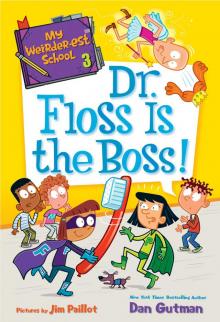 My Weirder-est School #3
My Weirder-est School #3 Bummer in the Summer!
Bummer in the Summer!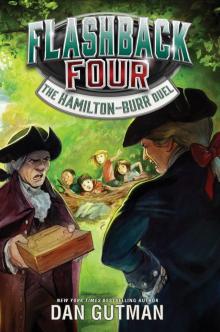 Flashback Four #4
Flashback Four #4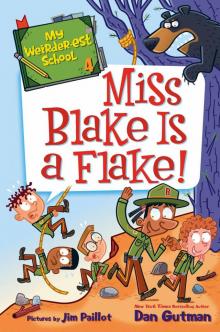 Miss Blake Is a Flake!
Miss Blake Is a Flake! My Weirder-est School #2
My Weirder-est School #2 My Weirder-est School #1
My Weirder-est School #1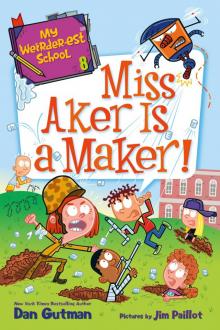 Miss Aker Is a Maker!
Miss Aker Is a Maker!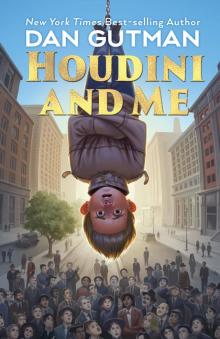 Houdini and Me
Houdini and Me Mr. Marty Loves a Party!
Mr. Marty Loves a Party! Ms. Jo-Jo Is a Yo-Yo!
Ms. Jo-Jo Is a Yo-Yo!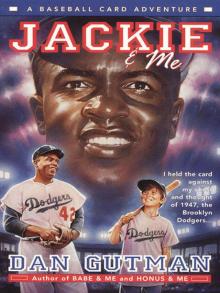 Jackie & Me
Jackie & Me Miss Newman Isn't Human!
Miss Newman Isn't Human!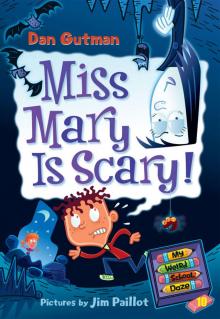 Miss Mary Is Scary!
Miss Mary Is Scary!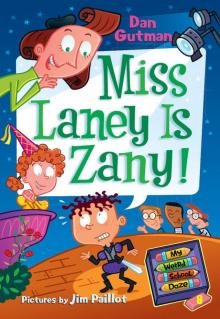 Miss Laney Is Zany!
Miss Laney Is Zany! Miss Tracy Is Spacey!
Miss Tracy Is Spacey! Ms. Krup Cracks Me Up!
Ms. Krup Cracks Me Up! Mrs. Cooney Is Loony!
Mrs. Cooney Is Loony! Dr. Nicholas Is Ridiculous!
Dr. Nicholas Is Ridiculous! My Weird School Special
My Weird School Special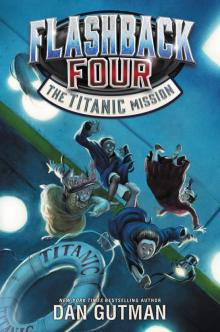 The Titanic Mission
The Titanic Mission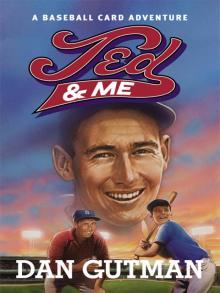 Ted & Me
Ted & Me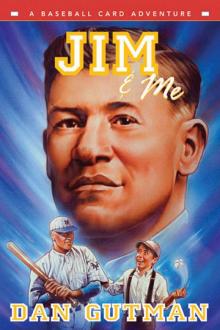 Jim & Me
Jim & Me Miss Child Has Gone Wild!
Miss Child Has Gone Wild! The Talent Show
The Talent Show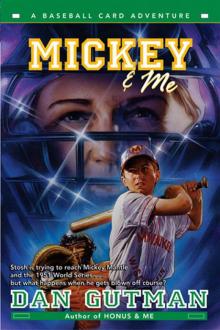 Mickey & Me
Mickey & Me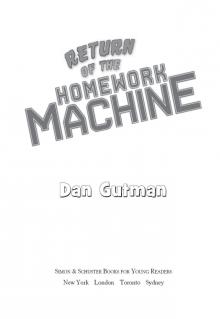 Return of the Homework Machine
Return of the Homework Machine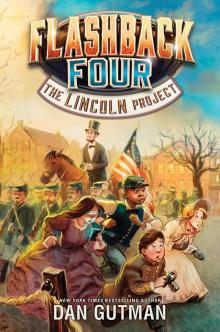 The Lincoln Project
The Lincoln Project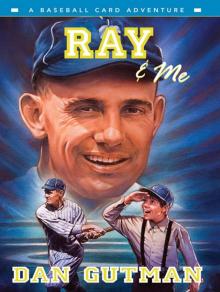 Ray & Me
Ray & Me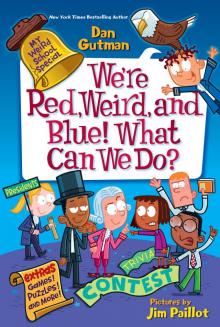 We're Red, Weird, and Blue! What Can We Do?
We're Red, Weird, and Blue! What Can We Do? The Get Rich Quick Club
The Get Rich Quick Club Funny Boy Versus the Bubble-Brained Barbers from the Big Bang
Funny Boy Versus the Bubble-Brained Barbers from the Big Bang Never Say Genius
Never Say Genius Miss Brown Is Upside Down!
Miss Brown Is Upside Down!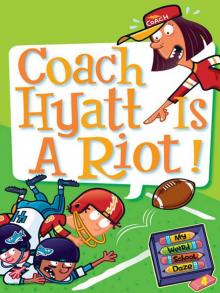 Coach Hyatt Is a Riot!
Coach Hyatt Is a Riot! The Christmas Genie
The Christmas Genie Mr. Burke Is Berserk!
Mr. Burke Is Berserk! Mr. Louie Is Screwy!
Mr. Louie Is Screwy! Mrs. Roopy Is Loopy!
Mrs. Roopy Is Loopy! Ms. Sue Has No Clue!
Ms. Sue Has No Clue!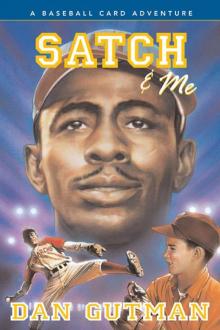 Satch & Me
Satch & Me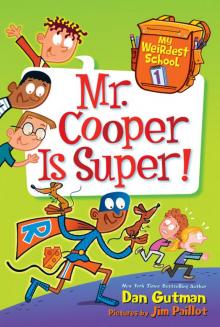 Mr. Cooper Is Super!
Mr. Cooper Is Super! Oh, Valentine, We've Lost Our Minds!
Oh, Valentine, We've Lost Our Minds! Miss Small Is off the Wall!
Miss Small Is off the Wall! Ms. LaGrange Is Strange!
Ms. LaGrange Is Strange! Funny Boy Meets the Dumbbell Dentist from Deimos (with Dangerous Dental Decay)
Funny Boy Meets the Dumbbell Dentist from Deimos (with Dangerous Dental Decay) Miss Daisy Is Still Crazy!
Miss Daisy Is Still Crazy! Ms. Leakey Is Freaky!
Ms. Leakey Is Freaky!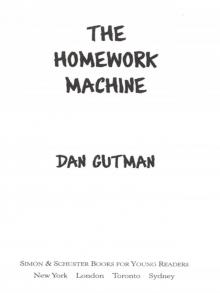 The Homework Machine
The Homework Machine Miss Holly Is Too Jolly!
Miss Holly Is Too Jolly! Mrs. Meyer Is on Fire!
Mrs. Meyer Is on Fire! Mrs. Master Is a Disaster!
Mrs. Master Is a Disaster! Ms. Beard Is Weird!
Ms. Beard Is Weird!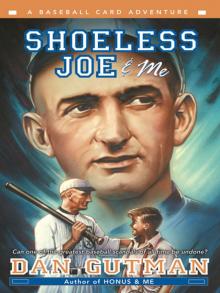 Shoeless Joe & Me
Shoeless Joe & Me Funny Boy Meets the Airsick Alien from Andromeda
Funny Boy Meets the Airsick Alien from Andromeda My Weird School Special: It’s Halloween, I’m Turning Green!
My Weird School Special: It’s Halloween, I’m Turning Green! Mrs. Lane Is a Pain!
Mrs. Lane Is a Pain! Miss Klute Is a Hoot!
Miss Klute Is a Hoot!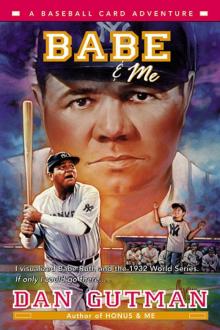 Babe & Me
Babe & Me The Genius Files 2 Never Say Genius
The Genius Files 2 Never Say Genius Mr. Nick Is a Lunatic!
Mr. Nick Is a Lunatic!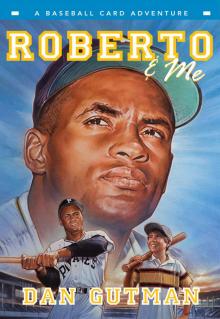 Roberto & Me
Roberto & Me Mrs. Lizzy Is Dizzy!
Mrs. Lizzy Is Dizzy!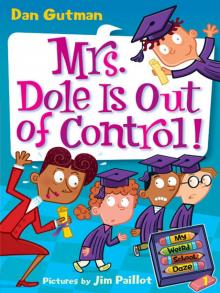 Mrs. Dole Is Out of Control!
Mrs. Dole Is Out of Control!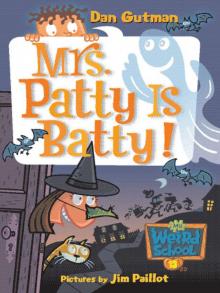 Mrs. Patty Is Batty!
Mrs. Patty Is Batty! Mr. Granite Is from Another Planet!
Mr. Granite Is from Another Planet! Dr. Brad Has Gone Mad!
Dr. Brad Has Gone Mad! Mr. Jack Is a Maniac!
Mr. Jack Is a Maniac! Funny Boy Takes on the Chit-Chatting Cheeses from Chattanooga
Funny Boy Takes on the Chit-Chatting Cheeses from Chattanooga Dr. Carbles Is Losing His Marbles!
Dr. Carbles Is Losing His Marbles!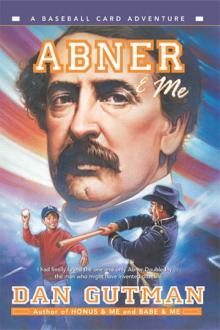 Abner & Me
Abner & Me Ms. Hannah Is Bananas!
Ms. Hannah Is Bananas! My Weirdest School #2
My Weirdest School #2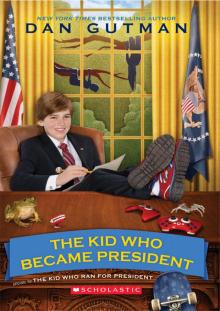 The Kid Who Became President
The Kid Who Became President Mrs. Kormel Is Not Normal!
Mrs. Kormel Is Not Normal! Getting Air
Getting Air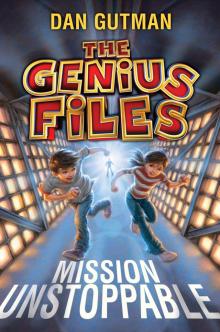 Mission Unstoppable
Mission Unstoppable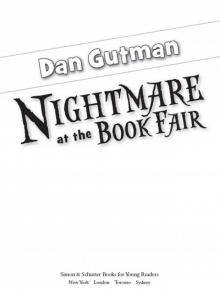 Nightmare at the Book Fair
Nightmare at the Book Fair License to Thrill
License to Thrill Mrs. Jafee Is Daffy!
Mrs. Jafee Is Daffy! Mr. Sunny Is Funny!
Mr. Sunny Is Funny! Mr. Hynde Is Out of His Mind!
Mr. Hynde Is Out of His Mind! The Kid Who Ran For President
The Kid Who Ran For President The Genius Files #4
The Genius Files #4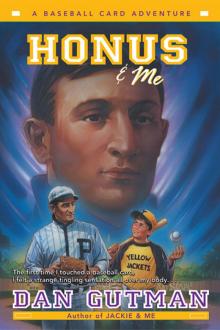 Honus & Me
Honus & Me Mr. Tony Is Full of Baloney!
Mr. Tony Is Full of Baloney! Miss Suki Is Kooky!
Miss Suki Is Kooky! Ms. Hall Is a Goofball!
Ms. Hall Is a Goofball!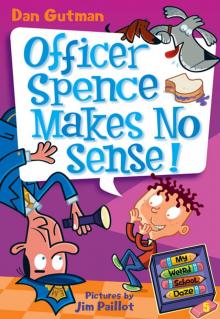 Officer Spence Makes No Sense
Officer Spence Makes No Sense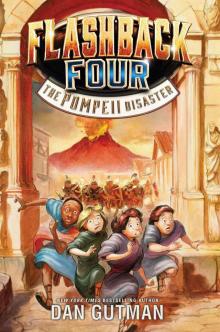 The Pompeii Disaster
The Pompeii Disaster Mr. Will Needs to Chill!
Mr. Will Needs to Chill!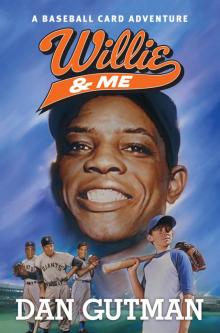 Willie & Me
Willie & Me Ms. Todd Is Odd!
Ms. Todd Is Odd!